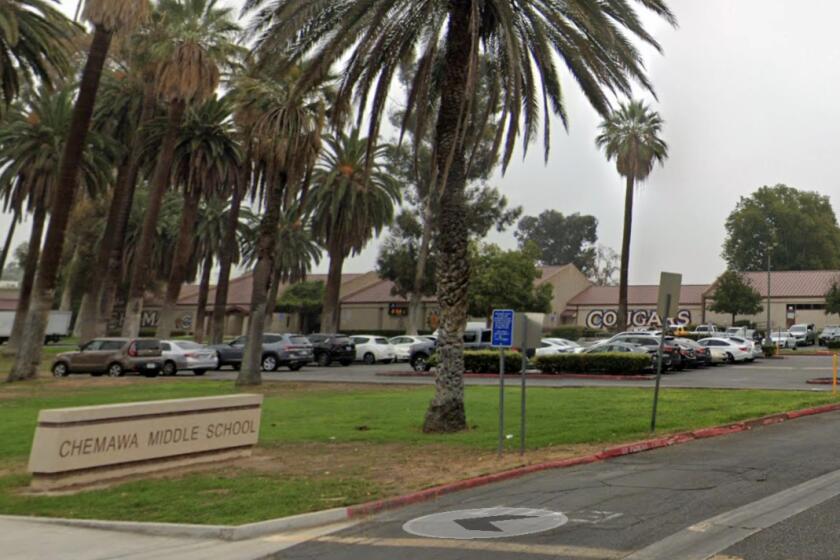Group Offers Funds to Create Better Schools : Education: Business-funded nonprofit corporation will award contracts up to $3 million to 20 or 30 groups to design innovative learning centers.
With a mixture of enthusiasm and skepticism, about 500 educators, corporate officials, community group leaders and parents met in Los Angeles Friday to help launch the President’s business-funded quest for radical reformation of the nation’s schools.
Officials of the New American Schools Development Corp., a private, nonprofit organization initiated by the Bush Administration as part of its “America 2000” education-reform package, outlined its broad criteria for the school-design contracts it plans to award in late April.
The 20 to 30 groups or individuals that are to receive design contracts ranging from $500,000 to $3 million must demonstrate that their proposed new schools will promise educational improvement for all students. Further, bidders must prove their schools would not cost more to run than their current counterparts, would get measureable results and could be easily replicated by other communities.
“We are not talking about islands of excellence,” said W. Frank Blount, the AT&T; executive who is president and chief executive officer of the schools development corporation. Blount called for “comprehensive, systemic change, not just tinkering around the edges.”
The schools development corporation was formed in July to raise between $150 million and $200 million from businesses to finance research-and-development teams to oversee the creation of innovative new schools.
Sponsored by the RAND Corp.’s Institute for Education and Training, Friday’s session was one of three--and the only one to be held outside the Washington area--to solicit interest in the project and to collect suggestions for fine-tuning the final proposal document, which is to be issued next month.
The plan outlined in Los Angeles represented a substantial shift from the corporation’s initial intent to award much larger contracts--up to $30 million each--to no more than seven groups. The original concept was criticized by some who feared a few large projects would not lead to programs that could be widely disseminated.
Blount said the field of contract holders will be narrowed twice during the five-year life of the corporation. The number chosen for the one-year design phase will be winnowed to 10 to 15 with contracts of about $1.5 million apiece for the two-year testing and development period, then cut to seven to 10, who will get between $2 million and $6 million for the two years required for implementation and replication to other areas.
Anyone with ideas can apply--individuals, foundations, universities, schools districts, corporations and other groups, Blount said.
The schools corporation also took some licks for the makeup of its board of directors, most of whom are white male business executives. The corporation is adding an advisory panel, to be chaired by Saul Cooperman, former New Jersey education commissioner. Its membership, which will include San Francisco schools Supt. Ramon Cortines, a participant in Friday’s conference, will be announced in Washington on Sept. 24.
David T. Kearns, deputy education secretary and Administration liaison with the corporation, in opening Friday’s session alluded to two other criticisms of the Bush education strategy--that it ignores myriad promising reform efforts already under way and that it is reluctant to commit substantial new monies to financially pinched schools.
Kearns, the former head of Xerox Corp., cited a recent nationwide poll as the basis for his belief that taxpayers would be willing to spend more for schools if they can be persuaded the schools are worthy.
“I believe money will flow into a good system,” Kearns said.
Acknowledging that some educators already are doing a good job, Kearns said the schools corporation research and development project is a vehicle to “stitch together all the terrific things that are happening out there.”
Reaction was mixed.
During the session’s brief question-and-answer period one man wanted assurances that the contracts would not go to “the same old sources” that usually get government grants. Two questioners wanted to know how children with disabilities fit into the reform agenda, while another criticized business’s strong role in the Bush education agenda by pointedly asking “Since when have the robber barons become the intellectuals?”
But one parent whose four children had gone through public schools, “none very successfully,” said she was “very excited” by the project.
More to Read
Sign up for Essential California
The most important California stories and recommendations in your inbox every morning.
You may occasionally receive promotional content from the Los Angeles Times.











